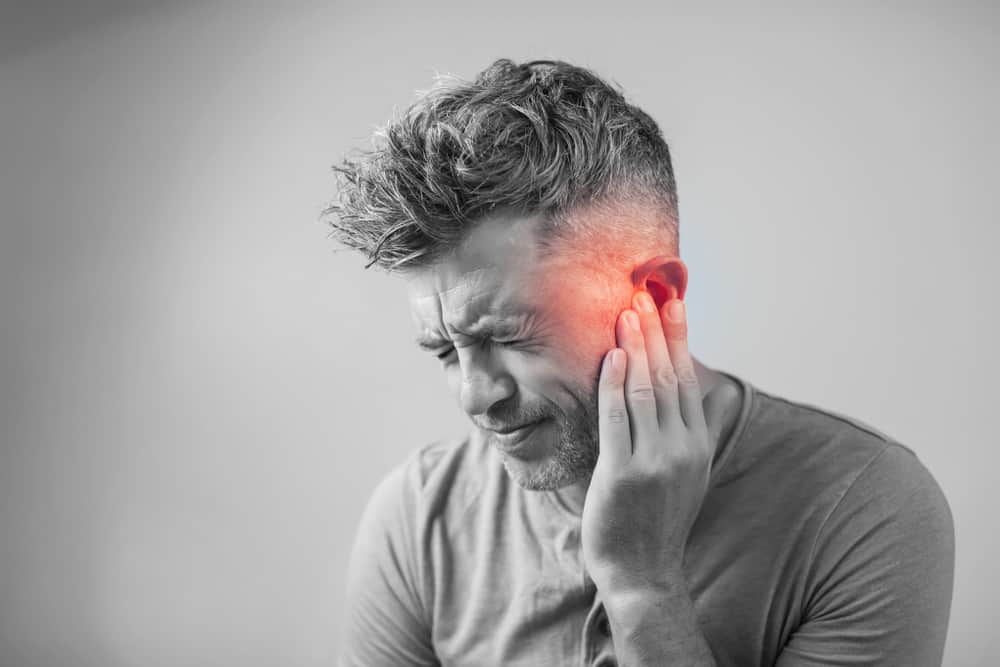Sufferers of tinnitus will be aware of the painful side effects it causes. Tinnitus sufferers have indicated increased stress and anxiety, as well as a loss of sleep. The consistent noise of tinnitus leads to irritability and frustration. But does it cause headaches as well?
It’s estimated that almost 15% of the general public suffer or have suffered from tinnitus, according to the U.S. Centers for Disease Control. That’s roughly 50 million Americans, and 20 million of them are struggling with chronic tinnitus.
Tinnitus leads to problems outside the frustrating noises. There is an assumed link between tinnitus and headaches. Tinnitus sufferers have indicated experiencing headaches related to the condition.
As both are such common complaints among the population, research remains ongoing.

Main Topics
What is tinnitus?
Tinnitus is the perception of hearing sounds without any outside stimulus. Tinnitus sufferers regularly report hearing sounds such as ringing, roaring, buzzing, hissing, humming, or music.
The causes of tinnitus are variable, and include hearing loss, obstructions to the middle ear, exposure to loud noise, and damage to the head or neck. Some people may experience tinnitus without realizing they have the condition.
There are two types of tinnitus. Subjective tinnitus is the most prevalent, and refers to tinnitus without any outside stimulus. The rarer case is pulsatile or objective tinnitus.
Pulsatile tinnitus presents as a pulsing or whooshing sound that occurs rhythmically, often in time with your heartbeat. If you suffer from pulsatile tinnitus, it’s possible for your doctor to hear your tinnitus when they examine you.
In some cases, pulsatile tinnitus is curable. Tinnitus may be acute, temporary, and clear up with no outside involvement. In other’s it can be chronic (ongoing). Research into tinnitus is developing, as there is currently no cure.
Can tinnitus cause headaches?
Yes, it’s thought that tinnitus can cause headaches. A 2015 study indicated that between 26% and 47% of tinnitus sufferers also experience headaches.
There is not yet any clear understanding of what causes the link, although studies remain ongoing. As both conditions have a range of causes, it’s difficult to establish past similarities.
In many cases, tinnitus and headaches may both be caused by the same underlying health condition. For example, TMJ (temporomandibular joint and muscle disorders) has been shown to lead to tinnitus and headaches.
If you have other symptoms, e.g. dizziness or loss of vision, consult your doctor.
There are many links between tinnitus and headaches. Frequent sufferers of both indicate similar complaints, including stress, anxiety, depression, and a loss of sleep. You should consult your doctor if you’re experiencing any of these side effects.
Not all sufferers of tinnitus will experience related headaches.
Migraines and tinnitus
There is strong evidence to suggest that migraines and tinnitus are interlinked. Frequent migraine sufferers report symptoms of tinnitus, and tinnitus sufferers have reported experiencing migraines.
Furthermore, those who suffer from tinnitus have indicated the tinnitus worsens during migraines. Frequent migraine sufferers have indicated it can cause tinnitus symptoms.
The two are thought to be linked by common pathophysiological mechanisms – responses caused by disease or injury.
Other types of headache
As well as migraines, tinnitus has been linked with Idiopathic Intracranial Hypertension (or IH), and post concussive headache. Concussion is a known cause of tinnitus.
If you’re suffering from concussion-induced tinnitus there may be a link between your concussion, tinnitus, and headaches. In both cases, if the headaches are prolonged or severe a doctor should be contacted.
What does a tinnitus headache feel like?
The most common form of a tinnitus headache is a migraine. A migraine is a moderate to severe headache, often felt as a throbbing pain, typically on one side of the head.
A migraine can be painful enough to disrupt everyday activities, and can last for several days at a time.
What are other side effects of tinnitus?
Tinnitus is the hearing of a noise not caused by outside stimulus.
Other side effects include anxiety, depression, irritability, loss of sleep, fatigue, and trouble concentrating. If you find tinnitus is seriously effecting your life and your ability to complete day-to-day activities, speak to your doctor about possible treatments.
Does aspirin cause tinnitus?
While there is some indication that aspirin can cause tinnitus, it only happens when ingested in large quantities or over a long period of time. Infrequent aspirin use has not been shown to lead to tinnitus.
When aspirin is no longer regularly taken, the symptoms of tinnitus are likely to fade.
If you’ve been treating your migraines with aspirin and you suffer from tinnitus it may be worth changing medication. Aspirin is effective at treating migraines, but so are other over-the-counter pain relief.
Speak to your doctor or a pharmacist before switching medications, to see what they recommend. There are suspected links between tinnitus and other medications. Generally, symptoms only occur when the medication is ingested in large amounts.
When the medication is stopped, the tinnitus often goes away.
How to ease a migraine caused by tinnitus
Unfortunately, there are not yet any cures for tinnitus. The recommendations for easing the symptoms are focused on removing stresses and loud, outside stimulation.
If you’re suffering from a tinnitus caused migraine, the first step is to remove yourself from any stressful situations. Try to relax by focusing on your breathing, or practicing yoga.
Researchers suggest that to lessen the effects of tinnitus, distracting the brain from the noise via other activities helps greatly. Improved sleep is also a help. Cutting back caffeine consumption and establishing a routine are good steps to take.
Although it may seem counterintuitive, it’s recommended to not remove yourself completely from noise. Low level background noise can give a distraction, and a sound to focus on separate from the tinnitus.
Noise machines and fans both offer a gentle sound that may relieve the symptoms of tinnitus. Long term sufferers of tinnitus can be treated with CBT (cognitive behavioral therapy). While it doesn’t remove the tinnitus, CBT has been reported to help limit the effects.
Leave a Reply